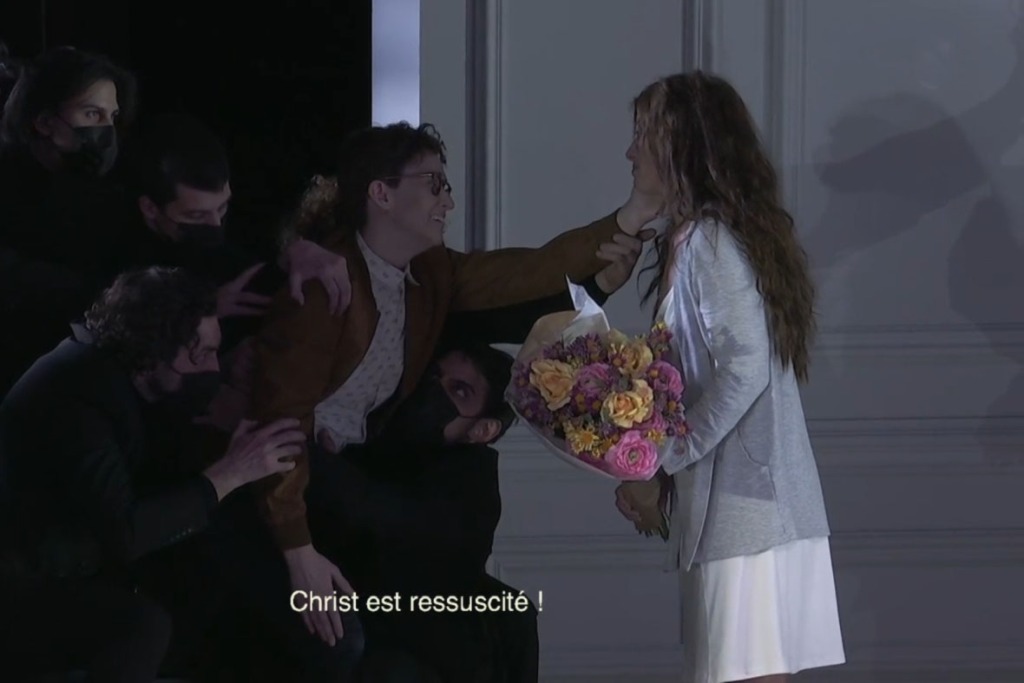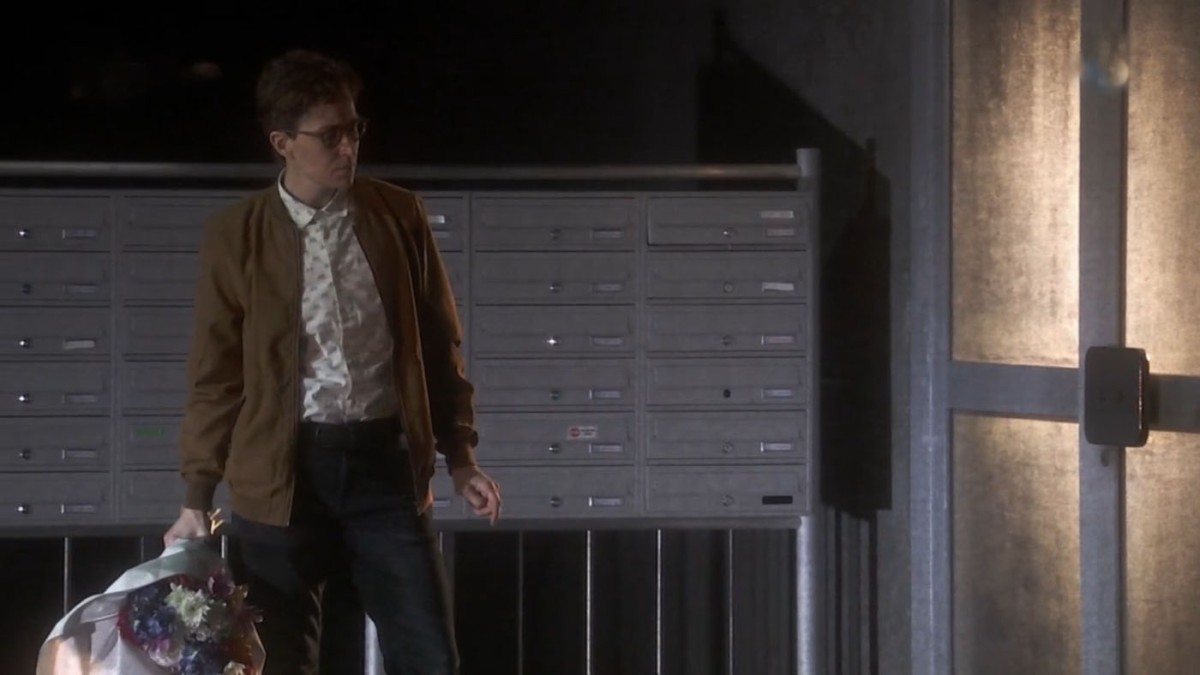[On the Street Where You Live Tobias Kratzer clearly said Trans Rights: Michèle Losier (Siebel) in Tobias Kratzer’s new staging of Gounod’s “Faust”, Paris/Opéra Bastille 2021]
…

…
I generally tend to enjoy Kratzer’s work because it is usually very smart, with a childlike joy of fable and usually comes up with sleek twists that later you cannot unsee. This is, again, at play in his recent, contemporary “Faust” reading for Paris: the interplay of young tenor Faust and old actor Faust is as simply as it is effective. Other than that, Kratzer embraces oversized, hyperrealistic video projections here. And they work. There’s a nighttime flight across Paris with the singers on ropes, later echoed in a nightime Paris galop with Faust as an urban cowboy. The first church scene is an an OB/GYN appointment (where, of course, the ever-faithful Siebel accompagnies Marguerite) complete with ultrasound, the second takes place in the metro, in an empty wagon where Méphisto frightens and accosts Marguerite, mirrored across the huge Bastille stage in video. There is a barely bearable video of Marguerite drowning the newborn in the bathtub. Valentin is a smarmy thug mercenary, presiding over a public basketball cage. Marthe oogles the mercenaries while taking out the trash, extra slow. Marguerite’s little apartment has sprung directly from an ingenue IKEA edition.
This is not a simple contemporary setting; the details are spot on and more than the sum of their parts.
The two biggest twists – major spoiler alert – are, 1) that Faust never sleeps with Marguerite, Méphisto steps in and effectively does a Siegfried/Gunther switch-off on a this violated, blindfolded Marguerite: this gives a backstory to Faust’s hesitancy (especially about the pregnancy), but also neatly dissects the entire Faust/Marguerite relationship as one big heternormative fetishization of female chastity that is nothing but a big projection from the start and showcase that chasm in the final scene, where Faust is not waltzing in as the great romantic option who finds himself tragically rejected because Marguerite chooses the purity he projected onto her, but where they don’t even talk to each other, Marguerite just as lost in a projection that society has conditioned her to seek.
But the second twist is even better, on the same level as Kratzer’s day-saving vigilante storyline for Marzelline in his London “Fidelio”. He has a knack for taking a closer look at plot nets and roles placed in second row and making those roles the nots and bolts of a narrative, appearing to lead scenes they are originally not even part of.
Here, it is Siebel, who is styled not just as the elegiac trouser mezzo, but who feels deliberately portrayed as a trans guy (look at that shirt, and at that shirt-glasses-jacket-sneaker combo. it is so spot on that it is uncanny).
And it is Siebel – Siebel the trans man – who gets the romantic hero storyline and who, ultimately, is portrayed as the only true, selfless lover in the entire opera, perhaps because he is not bound by the tocixity of heteronormative romance models.
This twist is built on Faust – hapless, cowardly, egoistic, very human Faust – who, in signing his contract with Méphisto, never put his own name on the line. The name that has been there, in silent agreement between the two men – Faust and Méphisto – has, from the start, been Marguerite, which we only understand in the end, when Siebel walks into the final scene with the bouquet of flowers he has tried, unsuccessfully, to hand to Marguerite throughout the evening. Siebel steps in front of Marguerite, who is about to be dragged of by Méphisto’s goons, only to be shown the contract.
And Siebel then does what never even occurred to Faust: he offers up himself to save the woman he loves, without demanding anything in return from her. He just finally gets to hand her the bouquet of flowers that he has been trying to give her throughout the opera, and smiles. He knows Marguerite won’t love him back, but his sacrifice does not hinge on compensation. And he is not staged to go out with swagger: when he is dragged off into Méphisto’s realm, he looks scared. Méphisto is hurrying after him; he got the soul he came for.
Marguerite remains, utterly broken by a sexist society and her own inability to find a way out, with a still halpess Faust who stays a mere onlooker, still as unable to establish a connection to another being as he was in the beginning.
The thing Faust would have needed, this reading seems to suggest, was not a second chance in from of a cheated second youth: Faust would have needed a change of heart instead (including, but not limited to, questioning heteronormative gender roles and the violence they enact).
The one character to break that particular barrier, while the off-stage choir sings of ressurection and rebirth? Siebel.
I am going to rewatch this, a lot. A brilliant reading. And you bet I have that final twist in screencaps:

…

…

…


…


Wow that sounds fascinating!
LikeLiked by 1 person
Yes. A Faust that confronts the interesting question, If I could have anything I want, why would I choose to be young, stupid, selfish, exploitative, and irresponsible, all over again? Well, perhaps not again; perhaps Faust was one of those pompous establishmentarian adolescents too busy with prestige and performance to have any emotional life until it’s just silly, like middle-aged men in ponytails with sportscars.
That is a wonderful look on Siebel. I specially like the eyeglasses, the way the project bashful yearning and, in one of your screencaps, heroic resolve.
LikeLiked by 1 person
Faust and Mephisto, The Evil and God: dudes hashing it out with dead sopranos paying the bill, unless there is heroic resolve in from of a mezzo. I really, really enjoyed this Siebel concept. They were very endearing, and just the right mix of bashful and heroic.
LikeLiked by 1 person
Old dudes, way old. Siebel is genuinely young and entitled to all those emotions. The others are just pulling strings.
LikeLiked by 1 person
Age, and more capacity of cunning due to more experience, and the lure of putting themselves first, as they have learned to do for so long, and forgotten to question it. Faust is here basically lost in his projection. Perhaps Siebel is also lost in one (though he sits at the OB/GYN with her), but he steps up and acrifices himself for her without asking anything in return (other than that she accepts his flowers).
LikeLike
There seems a possibility that Faust, asking to have his youth restored, is then overwhelmed by his young body and all its ramped-up amped-up desires and emotions, its impulsiveness, its inability to think about the future, so that his wisdom collapses into romantic lust, he gets her into trouble, and then he turns to, as you note, his infinitely old and evil soul mate for a way out, leaving genuine youth to act, as you note, with the grace and honor of being genuine. “Youth is wasted on the young” – an old man’s expression of greed and forgetfulness. So thanks again for this typically full and thoughtful and very well written review, it’s very suggestive.
LikeLike